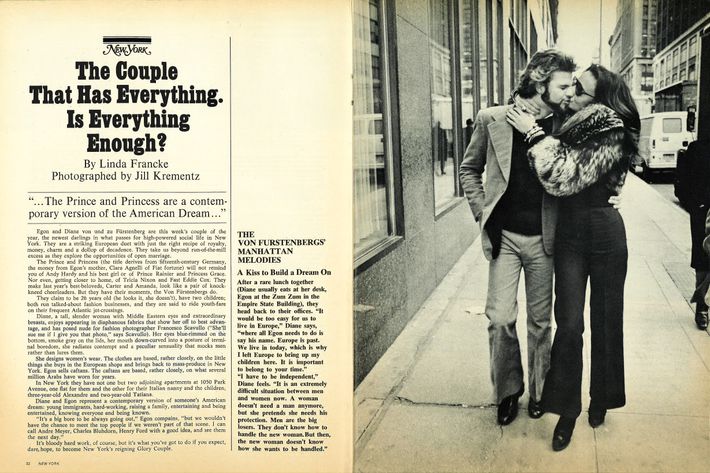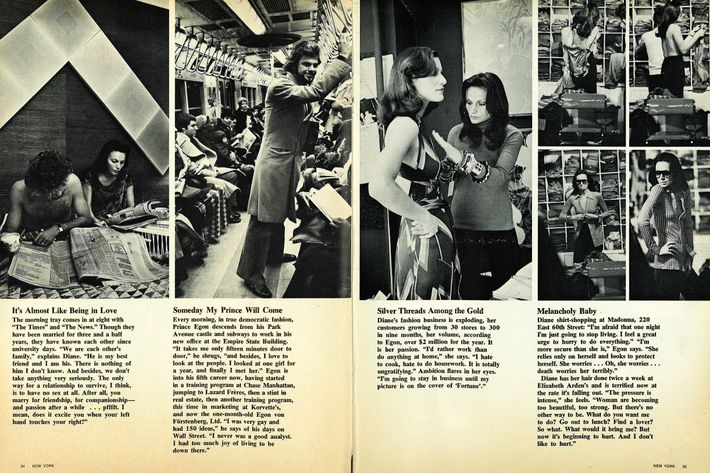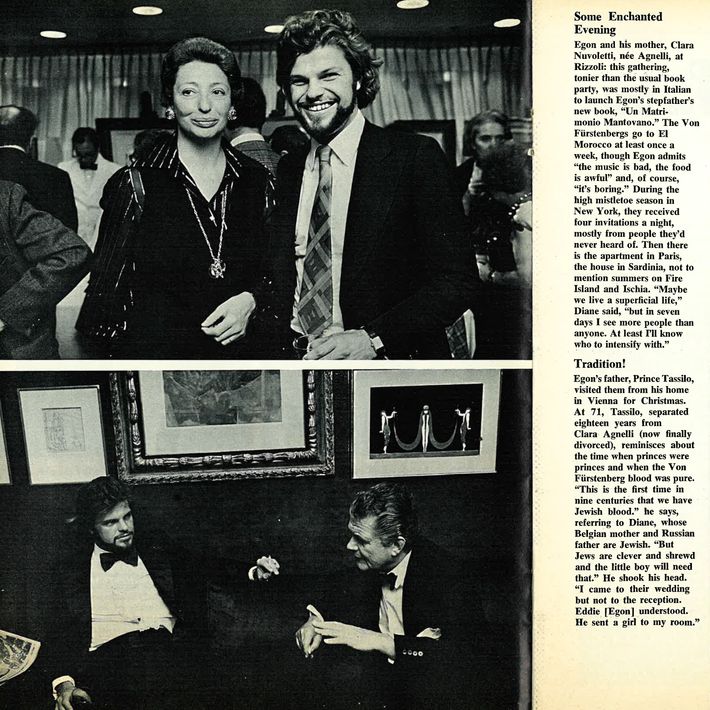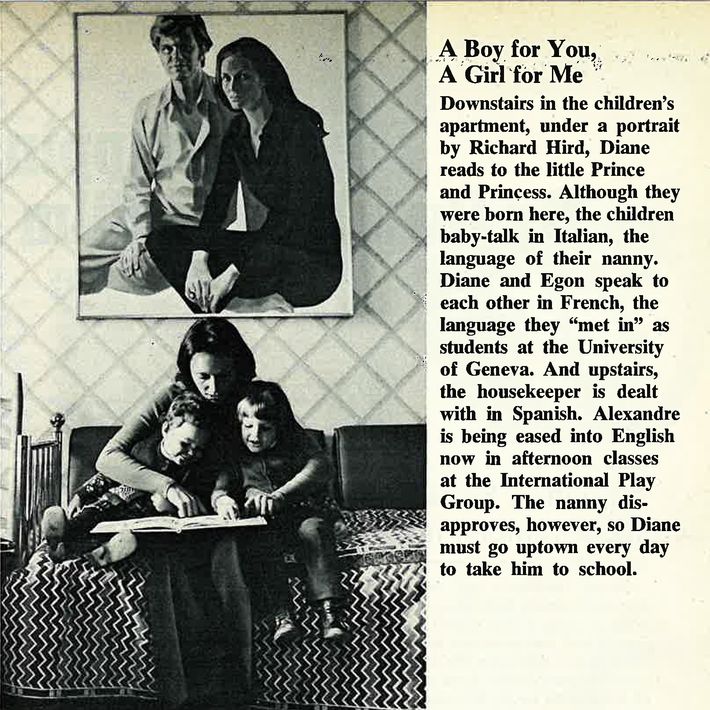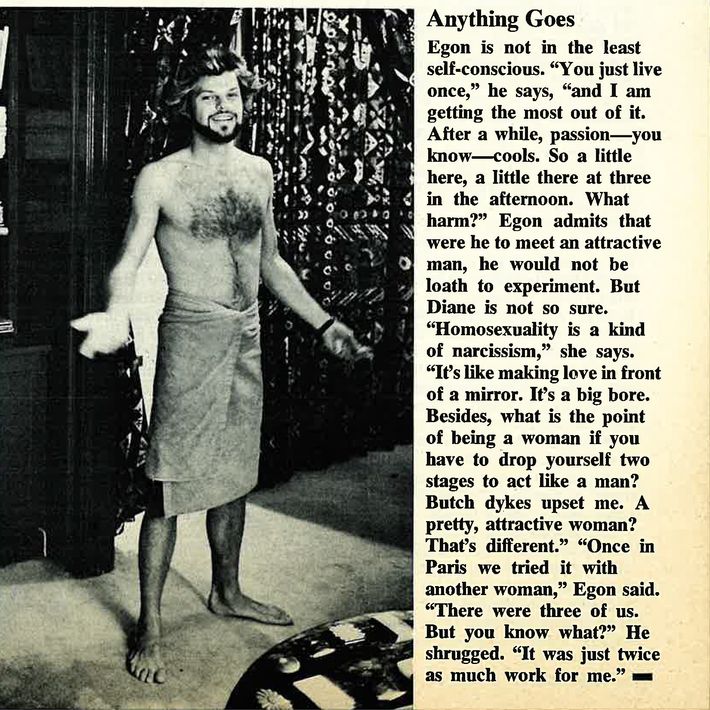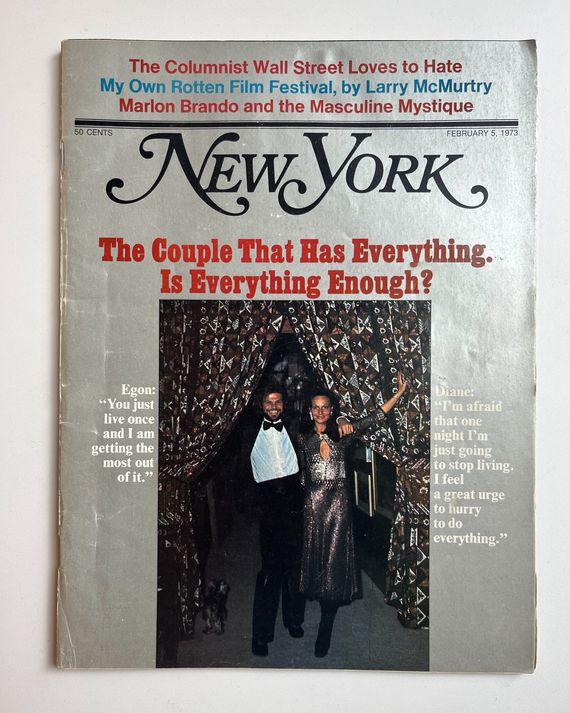
Editor’s note: This story first appeared in the February 5, 1973, issue of New York. (Diane von Fürstenberg later said that reading it made her realize her marriage was finished.) We’re republishing it here to mark the release of the documentary Diane von Furstenberg: Woman in Charge.
Egon and Diane von und zu Fürstenberg are this week’s couple of the year, the newest darlings in what passes for high-powered social life in New York. They are a striking European duet with just the right recipe of royalty, money, charm, and a dollop of decadence. They take us beyond run-of-the-mill excess as they explore the opportunities of open marriage.
The Prince and Princess (the title derives from 15th-century Germany, the money from Egon’s mother, Clara Agnelli of Fiat fortune) will not remind you of Andy Hardy and his best girl or of Prince Rainier and Princess Grace. Nor even, getting closer to home, of Tricia Nixon and Fast Eddie Cox. They make last year’s best-beloveds, Carter and Amanda, look like a pair of knock-kneed cheerleaders. But they have their moments, the Von Fürstenbergs do.
They claim to be 26 years old (he looks it, she doesn’t), have two children; both run talked-about fashion businesses, and they are said to ride youth-fare on their frequent Atlantic jet-crossings.
Diane, a tall, slender woman with Middle Eastern eyes and extraordinary breasts, enjoys appearing in diaphanous fabrics that show her off to best advantage, and has posed nude for fashion photographer Francesco Scavullo (“She’ll sue me if I give you that photo,” says Scavullo). Her eyes blue-rimmed on the bottom, smoke gray on the lids, her mouth down-curved into a posture of terminal boredom, she radiates contempt and a peculiar sensuality that mocks men rather than lures them.
She designs women’s wear. The clothes are based, rather closely, on the little things she buys in the European shops and brings back to mass-produce in New York. Egon sells caftans. The caftans are based, rather closely, on what several million Arabs have worn for years.
In New York they have not one but two adjoining apartments at 1050 Park Avenue, one flat for them and the other for their Italian nanny and the children, 3-year-old Alexandre and 2-year-old Tatiana.
Diane and Egon represent a contemporary version of someone’s American Dream: young immigrants, hard-working, raising a family, entertaining and being entertained, knowing everyone and being known.
“It’s a big bore to be always going out,” Egon complains, “but we wouldn’t have the chance to meet the top people if we weren’t part of that scene. I can call Andre Meyer, Charles Bluhdorn, Henry Ford with a good idea, and see them the next day.”
It’s bloody hard work, of course, but it’s what you’ve got to do if you expect, dare, hope, to become New York’s reigning Glory Couple.
The Von Fürstenbergs’ Manhattan Melodies: A Kiss to Build a Dream On
After a rare lunch together (Diane usually eats at her desk, Egon at the Zum Zum in the Empire State Building), they head back to their offices. “It would be too easy for us to live in Europe,” Diane says, “where all Egon needs to do is say his name. Europe is past. We live in today, which is why I left Europe to bring up my children here. It is important to belong to your time.”
“I have to be independent,” Diane feels. “It is an extremely difficult situation between men and women now. A woman doesn’t need a man anymore, but she pretends she needs his protection. Men are the big losers. They don’t know how to handle the new woman. But then, the new woman doesn’t know how she wants to be handled.”
It’s Almost Like Being in Love
The morning tray comes in at eight with the Times and the News. Though they have been married for three and a half years, they have known each other since university days. “We are each other’s family,” explains Diane. “He is my best friend and I am his. There is nothing of him I don’t know. And besides, we don’t take anything very seriously. The only way for a relationship to survive, I think, is to have no sex at all. After all, you marry for friendship, for companionship — and passion after a while … pfffft. I mean, does it excite you when your left hand touches your right?”
Someday My Prince Will Come
Every morning, in true democratic fashion, Prince Egon descends from his Park Avenue castle and subways to work in his new office at the Empire State Building. “It takes me only 15 minutes door to door,” he shrugs, “and besides, I love to look at the people. I looked at one girl for a year, and finally I met her.” Egon is into his fifth career now, having started in a training program at Chase Manhattan, jumping to Lazard Frères, then a stint in real estate, then another training program, this time in marketing at Korvette’s, and now the one-month-old Egon von Fürstenberg, Ltd. “I was very gay and had 150 ideas,” he says of his days on Wall Street. “I never was a good analyst. I had too much joy of living to be down there.”
Silver Threads Among the Gold
Diane’s fashion business is exploding, her customers growing from 30 stores to 300 in nine months, her volume, according to Egon, over $2 million for the year. It is her passion. “I’d rather work than do anything at home,” she says. “I hate to cook, hate to do housework. It is totally ungratifying.” Ambition flares in her eyes. “I’m going to stay in business until my picture is on the cover of Fortune.”
Melancholy Baby
Diane shirt-shopping at Madonna, 220 East 60th Street: “I’m afraid that one night I’m just going to stop living. I feel a great urge to hurry to do everything.” “I’m more secure than she is,” Egon says. “She relies only on herself and looks to protect herself. She worries … Oh, she worries … death worries her terribly.”
Diane has her hair done twice a week at Elizabeth Arden’s and is terrified now at the rate it’s falling out. “The pressure is intense,” she feels. “Woman are becoming too beautiful, too strong. But there’s no other way to be. What do you want me to do? Go out to lunch? Find a lover? So what. What would it bring me? But now it’s beginning to hurt. And I don’t like to hurt.”
Some Enchanted Evening
Egon and his mother, Clara Nuvoletti, née Agnelli, at Rizzoli: this gathering, tonier than the usual book party, was mostly in Italian to launch Egon’s stepfather’s new book, Un Matrimonio Mantovano. The Von Fürstenbergs go to El Morocco at least once a week, though Egon admits “the music is bad, the food is awful” and, of course, “it’s boring.” During the high mistletoe season in New York, they received four invitations a night, mostly from people they’d never heard of. Then there is the apartment in Paris, the house in Sardinia, not to mention summers on Fire Island and Ischia. “Maybe we live a superficial life,” Diane said, “but in seven days I see more people than anyone. At least I’ll know who to intensify with.”
Tradition!
Egon’s father, Prince Tassilo, visited them from his home in Vienna for Christmas. At 71, Tassilo, separated 18 years from Clara Agnelli (now finally divorced), reminisces about the time when princes were princes and when the Von Fürstenberg blood was pure. “This is the first time in nine centuries that we have Jewish blood.” he says, referring to Diane, whose Belgian mother and Russian father are Jewish. “But Jews are clever and shrewd and the little boy will need that.” He shook his head. “I came to their wedding but not to the reception. Eddie [Egon] understood. He sent a girl to my room.”
A Boy for You, a Girl for Me
Downstairs in the children’s apartment, under a portrait by Richard Hird, Diane reads to the little Prince and Princess. Although they were born here, the children baby-talk in Italian, the language of their nanny. Diane and Egon speak to each other in French, the language they “met in” as students at the University of Geneva. And upstairs, the housekeeper is dealt with in Spanish. Alexandre is being eased into English now in afternoon classes at the International Play Group. The nanny disapproves, however, so Diane must go uptown every day to take him to school.
Anything Goes
Egon is not in the least self-conscious. “You just live once,” he says, “and I am getting the most out of it. After a while, passion—you know—cools. So a little here, a little there at three in the afternoon. What harm?” Egon admits that were he to meet an attractive man, he would not be loath to experiment. But Diane is not so sure. “Homosexuality is a kind of narcissism,” she says. “It’s like making love in front of a mirror. It’s a big bore. Besides, what is the point of being a woman if you have to drop yourself two stages to act like a man? Butch dykes upset me. A pretty, attractive woman? That’s different.” “Once in Paris we tried it with another woman,” Egon said. “There were three of us. But you know what?” He shrugged. “It was just twice as much work for me.”


